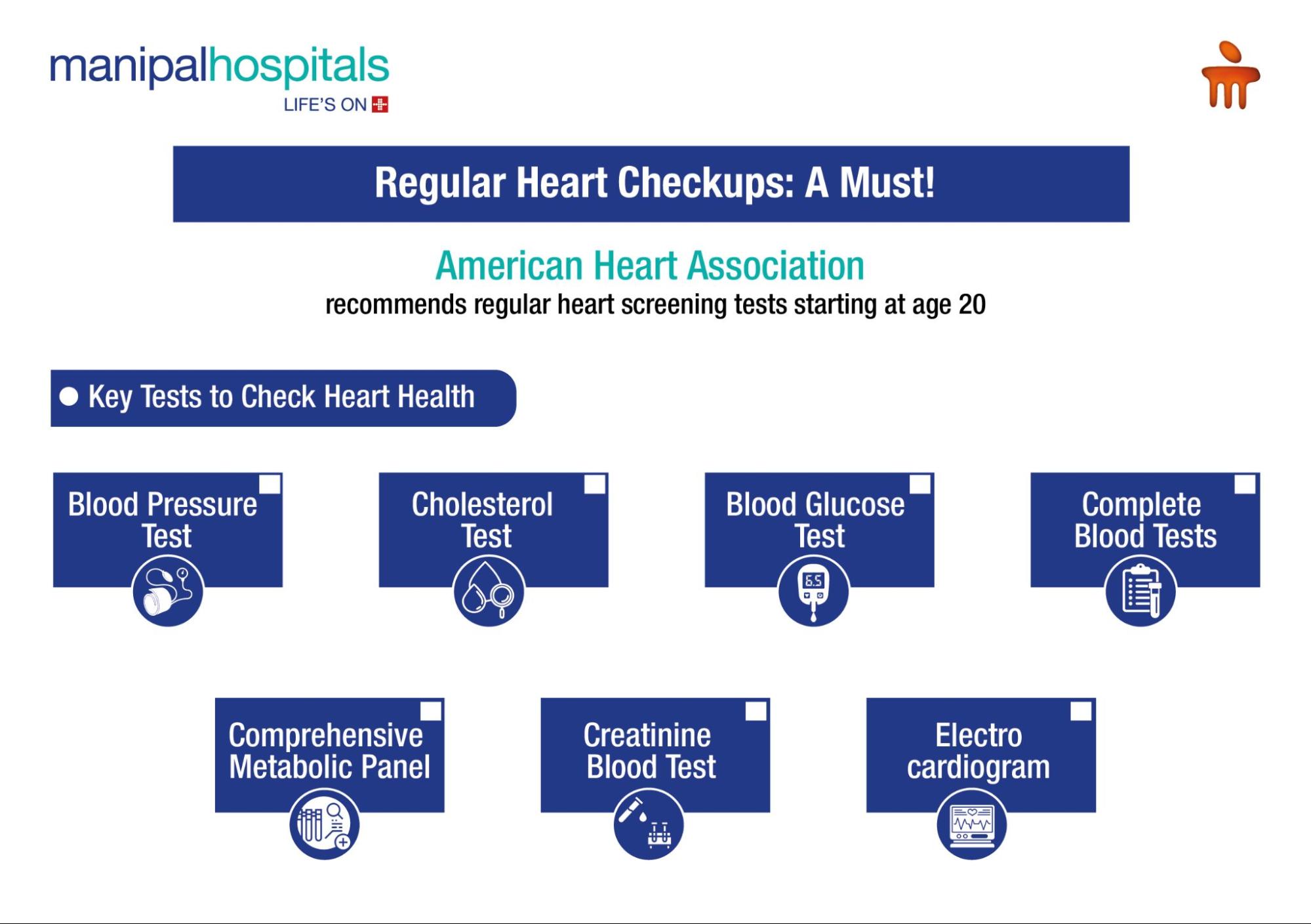
Listen to article
Loading audio...
Did you know that cardiovascular disease is the leading cause of death in India, accounting for 26.6% of total mortality as of 2017. The rising incidence of heart-related ailments has led to the loss of countless lives, but the good news is that many of these deaths are preventable. One powerful solution is through preventive cardiology and increasing cardiac health awareness. Each year on September 29th, World Heart Day is celebrated globally to highlight the importance of heart health and encourage proactive measures. Alongside awareness campaigns, a regular heart checkup is critical in preventing heart disease, enhancing overall heart health, and ultimately saving lives.
Synopsis
Why Are Heart Health Check-ups Important?
Some of the risk factors, like high cholesterol, high blood pressure, or specific heart conditions, can be symptomless and go undiagnosed until they cause serious complications. Therefore, it is vital to see your doctor and get tested regularly, allowing timely intervention.
A clear understanding of your medical history, lifestyle habits, and test results will provide a detailed picture of your heart health and help doctors prepare an optimal treatment plan.
Benefits of Regular Heart Check-ups
Many heart conditions are often incidentally diagnosed during a regular heart screening. Therefore, regular heart check-ups enable your doctor to identify potential health issues before they turn into something serious.
-
Identifies heart disease risk early and reduces your chances of becoming ill.
-
Helps get the right treatment early
-
Improves your overall health and well-being
-
Significantly reduces your healthcare costs
The American Heart Association recommends that individuals begin regular heart screening tests starting at age 20.
What Happens During a Heart Check-up?

During a heart check-up, your healthcare provider will conduct a series of tests to determine the presence of a heart ailment and devise a suitable treatment plan. At your check-up, you can expect:
-
Blood pressure test: Helps identify high blood pressure levels, which can put a strain on your heart and damage the arteries, which may even cause a heart attack or heart failure.
-
Cholesterol test: Since high cholesterol levels are often symptomless, a healthy individual must get their cholesterol level assessed every 4 to 5 years.
-
Blood glucose test: Diabetes risk can be analysed by measuring blood glucose levels.
-
Complete blood tests: A testing method to analyse your blood cells can also measure homocysteine, which at high levels can increase your risk of heart disease or stroke.
-
Comprehensive metabolic panel: The test can analyse your kidney and liver function. Any abnormality in the results could be an indicator of heart disease.
-
Creatinine blood test: High levels of creatinine in blood are an indicator of renal dysfunction, which could lead to heart ailments.
-
Electrocardiogram (ECG or EKG): It is not a part of your regular check-up. However, your doctor may recommend this test to determine your heart rate and rhythm.
Your pulse rate, oxygen saturation level, body mass index, and heart sounds will also be checked to identify any heart ailments.
How Can Your Doctor Help Prevent Heart Disease?
If your screening test indicates you are at risk of heart disease, your doctor may recommend lifestyle changes, which include losing weight, quitting smoking, and exercising regularly. They will also provide nutritional support, advising what you can or cannot eat. If lifestyle changes do not help, they will prescribe you medications to lower your heart disease risk. A surgical intervention may also be recommended if you have a heart ailment that requires immediate attention.
Tips for Maintaining Heart Health
To prevent the risk of developing heart disease, a healthy lifestyle is essential, which includes:
-
Avoid smoking or tobacco consumption
-
Engage in moderate-intensity exercise for at least 150 minutes per week
-
Eat nutrient-rich food, including fruits, vegetables, and whole grains
-
Limit your consumption of fat and sugar
-
Maintain a healthy weight
Promoting Heart Health with Awareness Campaigns
Every year, the World Heart Federation promotes an International Heart Day to raise awareness about cardiovascular diseases, their prevention, and their impact globally. Healthy Heart Day is celebrated on September 29th, and a theme is declared for the day. Unlike previous years, the Heart Day campaign for the years 2024 to 2026 is “Use Heart for Action”, which encourages individuals to prioritise heart health. It also empowers them to urge their leaders to develop policies that promote heart health.
Conclusion
Regular heart health check-ups can help diagnose heart disease early, manage risk factors, and ultimately prevent heart disease. Making heart health a priority is crucial for our well-being and is also advocated by global initiatives like World Heart Day. So, don’t wait; book your next heart health check-up at Manipal Hospitals, Patiala.
FAQ's
-
Coronary artery disease
-
High blood pressure
-
Arrhythmia
-
Heart failure
-
Congenital heart defects
-
Atherosclerosis
Individuals who are obese, have diabetes, have high blood pressure, or are dealing with high stress or anxiety are susceptible to developing heart disease. If you are someone who smokes or drinks regularly or does not exercise, you should also undergo heart health check-ups.
The frequency of heart check-ups largely depends on your age, family history, risk factors, or lifestyle. However, if you experience indications of a cardiac condition (chest discomfort, shortness, or sweating), you should visit your doctor immediately.
Yes, it is possible to monitor your heart health at home by regularly checking your BMI, blood pressure, or glucose levels and measuring your heart rate and rhythm with a wearable fitness tracker.
To schedule an appointment at Manipal Hospitals, Patiala, contact our Cardiology Department or visit our website.



















 5 Min Read
5 Min Read















